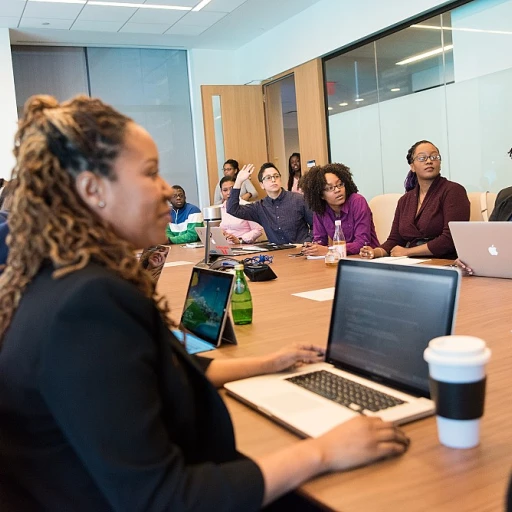
The Essence of a Change Agent in HR
The Fundamental Role of Catalysts in Change
The essence of a change agent in HR leadership is rooted in their critical role as catalysts of transformation within an organization. These individuals drive the shift from existing practices towards new, effective methods that align with the company’s strategic objectives. Change agents are distinguished not just by their position but by their ability to inspire confidence and foster an environment conducive to change.
In the realm of human resources, where the well-being and performance of employees are paramount, change agents must balance organizational goals with empathetic people management. They play a pivotal role by understanding the change process models and how these can be effectively implemented to support cohesive transformation throughout the company.
While steering organizational change, these agents must identify and address various forms of resistance that may arise internally from employees or externally from other stakeholders. Their role is not limited to advocating for change initiatives but extends to assisting team members in adapting to new roles and processes.
As the business landscape continually evolves, the role of a change agent becomes increasingly vital. They are not only responsible for managing change within their departments but also for embedding a culture of adaptability across the organization. This involves leveraging both the internal and external channels to facilitate seamless transitions, thereby achieving organizational change objectives efficiently.
Key Responsibilities of a Change Agent
Principal Duties
Change agents in the realm of human resources play an instrumental role in sculpting the organizational landscape to effectively manage transformations. They are tasked with spearheading change initiatives within the company, ensuring that both internal and external changes align with the organizational goals.
These agents are responsible for driving the change process forward by carefully crafting and implementing strategies that foster organizational change. Their initiatives are designed to mitigate resistance and build support among team members and employees. To achieve this, they develop comprehensive plans that detail every aspect of the change initiative, from inception to execution, to facilitate a seamless transition.
Collaboration and Support
Working closely with other departments, change agents ensure that the necessary resources and support are available for a successful change. They serve as the bridge between different sections of the organization, promoting understanding and collaboration among team members. Moreover, they engage in active dialogue with stakeholders to align the intended changes with business objectives, thereby enhancing the overall effectiveness of the change management process.
Communication and Training
A significant element of the change agent's role is communication. They must articulate the benefits of change to all stakeholders and provide a roadmap for achieving the desired outcomes. This includes offering training and development programs to enhance the skills and capabilities of employees, enabling them to adapt swiftly to new processes and technologies. Communicating effectively helps in reducing uncertainty and fosters a culture of openness and adaptability within the organization.
Skills Required for Effective Change Management
Essential Skills for Navigating Change
In the dynamic world of human resources, the role of a change agent is pivotal in steering organizations through transformation. To effectively manage change, certain skills are indispensable. These skills not only help in overcoming resistance but also in aligning organizational goals with change initiatives.
Communication and Interpersonal Skills
Effective communication is at the heart of successful change management. Change agents must articulate the vision and benefits of change clearly to all stakeholders. This involves not just conveying messages but also listening to feedback and addressing concerns. Strong interpersonal skills are crucial for building trust and fostering collaboration among team members and employees.
Strategic Thinking and Problem Solving
Change agents need to possess strategic thinking abilities to foresee potential challenges and devise solutions. They must analyze the business environment and understand how changes will impact the organization. Problem-solving skills enable them to navigate obstacles and ensure that change initiatives are implemented smoothly.
Leadership and Influence
Leadership is a core component of a change agent's role. They must inspire and motivate others to embrace change. This requires the ability to influence and guide people through the change process, ensuring that everyone is aligned with the organizational transformation goals. By demonstrating leadership, change agents can effectively support change and drive successful outcomes.
Adaptability and Resilience
Change is often met with resistance, making adaptability and resilience vital skills for change agents. They must be flexible in their approach and resilient in the face of setbacks. This adaptability allows them to adjust strategies as needed and maintain momentum in the change process.
For those interested in enhancing their skills in this area, exploring digital strategy services can provide valuable insights into aligning business growth with change management efforts.
Challenges Faced by Change Agents in HR
Overcoming Obstacles in Driving Change
Navigating the complexities of change management within an organization is not without its hurdles. Change agents often face significant challenges as they attempt to steer their company towards effective transformation. Here's a closer look at some of the common obstacles they encounter:- Resistance to Change: This is perhaps the most well-known challenge. People naturally resist changes to their routine or comfort zone, making it difficult for change agents to implement new initiatives. Success in change processes often depends on effectively managing this resistance, requiring a deep understanding of organizational behavior and psychology.
- Alignment with Organizational Goals: Ensuring that change initiatives align with broader organizational goals is critical. If there’s misalignment, employees may feel the efforts are unnecessary or even counterproductive, leading to entrenched opposition or apathy towards the change.
- Lack of Support from Leadership: A common hurdle for change agents is gaining adequate support from senior leadership. Without their backing, even the most well-designed change initiative may falter. It’s crucial for change agents to secure strong sponsorship to provide the necessary authority and resources for successful change management.
- Inadequate Communication: Clear, consistent communication is essential to convey the purpose, process, and benefits of the change. A failure in communication can lead to misunderstandings and a lack of buy-in from team members and stakeholders, derailing efforts of agents to support change.
- Insufficient Resources: Lack of resources can severely limit the ability to execute change initiatives effectively. Whether it’s financial resources, technology, or personnel, any deficits can compromise the process and outcomes of organizational change.
- Cultural Barriers: Organizational culture can either be a facilitator or a barrier to change. Change agents must be able to assess and, if necessary, shift the culture to one that supports transformation efforts, which requires both strategic foresight and sensitivity to the existing company ethos.
Case Studies: Successful Change Agents in HR
Illustrating Effective Change Management Through Case Studies
The role of a change agent in organizational transformation can be best understood through real-world examples of successful change initiatives. These case studies not only highlight the importance of change management skills but also demonstrate how overcoming challenges can lead to achieving organizational goals. One notable example involves a company facing significant resistance during a digital transformation initiative. The change agents involved played a critical role in facilitating communication between management and employees, ensuring that everyone understood the benefits of the change process. By arranging regular workshops and feedback sessions, they were able to support change by addressing concerns and aligning everyone with the company's vision. In another case, an organization aimed to improve its internal communication and collaboration. This internal change required agents to act as liaisons between different departments, ensuring that the change initiatives were smoothly executed. The change agents utilized their skills in fostering open dialogue, which helped overcome organizational resistance. A different scenario involved an external change where a business sought to expand its operations internationally. The change agents here were pivotal in adapting organizational culture to new markets. They helped integrate new team members and roles, creating a cohesive environment that supported the company's expansion goals. These case studies emphasize that the success of a change initiative heavily relies on how well change agents manage resistance and engage with stakeholders. Their ability to facilitate open communication and provide continuous support throughout the change process is crucial for the effective transformation of the organization.Future Trends in Change Management for HR Leaders
The Evolving Landscape of Change Management for HR Leaders
As organizations continue to adapt in an ever-changing business environment, the role of a change agent within human resources is expected to evolve significantly. Key to this transformation is understanding how change management strategies can be integrated into organizational goals to ensure resilience and adaptability. Change agents, who are central to this process, must anticipate and navigate the challenges of internal and external organizational change. With the rise of digital transformation, HR leaders must harness new technologies to facilitate change, ensuring that both processes and people are aligned in the broader change initiative.- Embracing Technology: The increased integration of digital tools in HR processes to support change initiatives will be crucial. Change agents need to be adept in utilizing data analytics to predict resistance and measure the success of change efforts.
- Focus on Employee Experience: As change processes become more employee-centric, HR leaders must ensure that initiatives are designed to minimize disruption and promote engagement among team members.
- Agility and Flexibility: Organizations will increasingly require change agents who can adapt quickly to shifts in business priorities and market dynamics. This flexibility will be vital in maintaining alignment with organizational goals.
- Enhancing Leadership Skills: Effective change leaders will need to focus on developing skills that foster collaboration and innovation within the organization. Building a culture that supports continuous learning and development will be key to successful change management.













